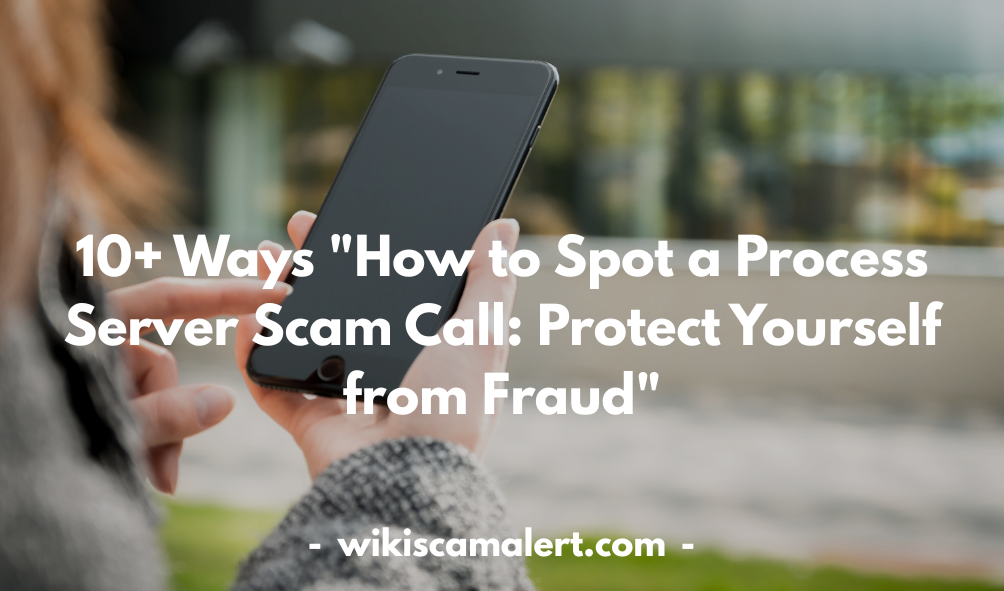In today’s digital age, scams have evolved, and one of the most concerning frauds involves process server scam calls. These scams can cause significant financial and emotional stress, as scammers pose as official process servers, tricking individuals into paying bogus fees or sharing sensitive personal information. But how do you differentiate between a real process server and a scammer?
Understanding Process Server Scam Calls
A process server is an official who delivers legal documents to individuals involved in legal proceedings, such as court summons, subpoenas, or complaints. These documents are part of the due process of law, ensuring that individuals are notified of legal actions that may affect them.
However, scammers have latched onto this process, creating fake process server scam calls that can leave victims confused and distressed. These fraudulent calls are designed to manipulate people into paying money or providing sensitive personal information under the guise of legal notifications. Often, these scams prey on people’s lack of knowledge about how legal processes work, making it easier for the scammers to trick them into compliance.
How Process Server Scam Calls Work
Scammers posing as process servers typically initiate contact through phone calls, leaving messages that appear urgent and legal in nature. They may claim that you are being sued, or that you have failed to respond to legal documents, and a process server needs to deliver legal paperwork to your address. To make it seem more convincing, the caller might even reference a case number or threaten immediate action, like an arrest or legal consequences, if you do not act quickly.
Here’s how a typical process server scam phone call might unfold:
- Initial Contact: The scammer calls and claims to be a process server or representative of a legal firm. They may state that they have a legal document to deliver or that you are involved in a lawsuit.
- Pressure Tactics: They apply pressure, urging you to act quickly. The caller might say that the document must be signed and returned to avoid arrest, fines, or other legal issues.
- Payment Demands: The scammer requests payment immediately to avoid further consequences, such as court appearance fees or other charges. Often, the payment will be requested via untraceable means like gift cards or wire transfers.
- Final Threats: If the victim is hesitant, the scammer might escalate the threat, warning that an arrest is imminent, or legal action will be taken, thereby putting undue stress on the individual to comply.
These calls can sound authoritative and can convince even the most cautious individuals to act impulsively. The scammers rely on your fear and confusion to get you to pay money or give out sensitive details.
Common Tactics Used in Process Server Scam Calls
Scammers rely on several common tactics to manipulate their victims during process server scam calls. Here are the most common strategies used:
- Urgency and Pressure: Scammers will almost always pressure the victim into acting quickly. They may say things like, “You must respond by today, or you will face arrest!” This creates an urgency that can cloud the victim’s judgment.
- Falsified Legal Jargon: To make their claims sound legitimate, scammers often use complicated legal language or claim they are working for law firms or court systems. They may even use fake case numbers or reference the names of legitimate companies.
- Threatening Arrest or Lawsuits: The ultimate goal is to scare the victim into paying or complying. The scammer may claim that you are about to be arrested or taken to court for your noncompliance.
- Payment Requests via Untraceable Methods: One of the most significant red flags in a process server call scam is when payment is requested through hard-to-trace methods, such as gift cards, wire transfers, or cryptocurrency. Legitimate legal services rarely demand payment in such untraceable ways.
- Fake Caller IDs: Scammers often spoof caller IDs to make it look like they are calling from a legitimate number, such as a court or government agency. This adds another layer of deception and makes it harder for victims to recognize the scam.
Red Flags to Look Out for in Process Server Scam Calls
It’s essential to be aware of the warning signs that indicate you might be dealing with a process server scam call. Here are the key red flags to look for:
- Pressure to Act Quickly: If the caller insists that you must act immediately, or threatens negative consequences if you don’t, it’s a strong sign that the call is a scam. Legitimate process servers don’t operate under such high-pressure conditions.
- Request for Payment Upfront: If the caller asks for money upfront for the delivery of legal documents or to avoid further consequences, it’s likely a scam. Legitimate process servers don’t ask for payments in advance; any legal fees are handled through the court system.
- Suspicious Payment Methods: If the scammer asks you to pay using gift cards, wire transfers, or untraceable methods, this is a huge red flag. No legitimate organization would request payment this way.
- Lack of Written Confirmation: Real process servers will usually provide a written notice, either via mail or email, before contacting you. If the caller refuses to send written confirmation or provides vague details about the legal matter, it’s a scam.
- Unfamiliar Case or Legal Issue: If the call refers to a case or legal matter you know nothing about, and they pressure you for immediate action, it’s highly likely that it’s a scam. Scammers often create false claims to intimidate their targets.
How to Differentiate Between Real and Fake Process Server Calls
Understanding the differences between real and fake process server calls can save you from falling victim to a scam. Here are key indicators of a legitimate process server call:
- Call Verification: A legitimate process server will usually identify themselves by name and provide details about the documents they are delivering. They may ask for an appointment or request your address for delivery purposes. On the other hand, scammers often rush through their explanation and create confusion to prevent you from verifying the legitimacy of the call.
- Written Notice: If the caller claims to be serving legal documents, ask them to provide written notice via certified mail. A real process server will not hesitate to do this. Scammers, however, might refuse or provide vague responses.
- No Payment Demands: Real process servers do not ask for payments over the phone. If a payment is required, it should be processed through proper legal channels, such as paying the court directly for filing fees or service charges. If the call requests payment by untraceable means, it’s a clear sign of a scam.
- Proper Identification: Legitimate process servers are usually licensed and can identify themselves with appropriate credentials. Scammers, however, will avoid providing any form of professional identification or credentials.
- No Threats of Arrest: A real process server does not threaten arrest or jail time if documents are not accepted. They are merely responsible for delivering the documents. If someone threatens jail time or heavy fines, you are likely dealing with a scam.

What Happens If You Respond to a Process Server Scam Call
Responding to a process server scam call can have a range of consequences, all of which are typically negative for the victim. Scammers rely on your fear, confusion, and lack of knowledge about legal processes to manipulate you into taking actions that benefit them, often financially. Here’s what can happen if you fall for or respond to a process server scam phone call:
- Financial Losses: If you respond to the scam, the most likely outcome is that you’ll be pressured into paying the scammer. They may ask for money to avoid legal action, arrest, or other fabricated consequences. You may be tricked into wiring funds, buying gift cards, or even transferring cryptocurrency. Once you make the payment, you will likely never hear from the scammer again, and your money will be lost with no recourse for a refund.
- Sharing Personal Information: Scammers often ask for sensitive information like your Social Security number, bank account details, or even your full address under the pretense of confirming your identity or serving legal documents. Giving out this information can open you up to identity theft and financial fraud. Your personal details may be sold to other criminals or used to commit further fraudulent activities.
- Emotional and Psychological Impact: Dealing with the stress and confusion of a fake legal threat can be emotionally taxing. Victims may feel anxious or fearful about potential legal consequences. In extreme cases, the emotional toll can be overwhelming, leading to depression or other mental health issues.
- Wasted Time and Effort: Responding to a scam takes up your time and energy for no real result. You may spend hours trying to deal with the fraudster or trying to track down where the call came from, only to realize too late that it was all a scam. Time lost on handling these calls could be better spent focusing on real legal or personal matters.
To protect yourself, it’s crucial to recognize the signs of a scam early and avoid responding to these types of calls.
Legal Consequences of Ignoring Process Server Scam Calls
While ignoring a process server scam call itself doesn’t carry direct legal consequences, failing to recognize a legitimate legal process can lead to significant issues. Let’s break it down:
- Failure to Respond to Real Legal Notifications: A real process server might reach out to inform you about legal proceedings, such as lawsuits or subpoenas. If you ignore or miss these legitimate notifications, the case could proceed without your participation, and the court could rule against you by default. This is often referred to as a “default judgment,” which could result in a judgment against you, possibly including monetary fines, garnished wages, or other penalties.
- Escalating Legal Actions: If you mistakenly ignore a legitimate legal notice because it’s confused with a scam, the case could escalate. A court judgment could lead to more severe consequences, such as wage garnishment, asset seizure, or even arrest if the situation involves criminal charges.
- Potential Fines or Arrest: In some cases, legitimate legal proceedings can involve consequences for failing to comply with court orders. For example, ignoring a subpoena could lead to a contempt of court charge. These charges could lead to fines or even arrest. However, process server scam calls that threaten arrest for noncompliance are fraudulent and carry no legal weight.
- Prolonging Legal Troubles: If you fail to act upon a legitimate legal notice, it could make your legal situation worse. You may lose the opportunity to dispute the case or settle the matter before it goes to court.
Ignoring a process server scam call won’t typically result in legal penalties, but it is important to differentiate between scams and real legal matters to avoid missing an opportunity to address valid issues.
The Role of a Legitimate Process Server
A legitimate process server plays a crucial role in the legal system, ensuring that individuals are properly notified of legal proceedings. Process servers are responsible for delivering legal documents to individuals involved in lawsuits or other legal matters. These documents may include subpoenas, summons, complaints, or notices of hearings. Here are the key functions of a legitimate process server:
- Delivery of Legal Documents: The primary role of a process server is to deliver legal documents to the individuals involved in a case. The process server ensures that the recipient is aware of their involvement in legal proceedings, which is a critical part of the justice system.
- Verification of Service: After delivering legal documents, a process server provides verification of the delivery, which is usually a signed receipt from the individual who received the documents. This is a necessary step in the legal process to prove that the individual has been properly notified.
- No Involvement in Legal Decisions: Unlike what some scammers may suggest, a real process server does not make any decisions regarding the legal proceedings. They are simply a messenger who ensures that the defendant or individual is aware of the case and can respond appropriately.
- No Requests for Payment: A legitimate process server does not ask for payment in exchange for delivering documents. Any fees related to the service of process are typically handled through the courts or the law firm handling the case.
- Follow Legal Procedures: Process servers are bound by laws and regulations about how they can deliver documents. They cannot force entry into a person’s home or use excessive force. They are required to follow legal procedures carefully, and their actions are generally subject to scrutiny.
A legitimate process server will never threaten or intimidate you, nor will they ask for personal information or payment upfront.
How to Verify the Legitimacy of a Process Server Call
If you receive a process server call scam, it’s important to verify its legitimacy to avoid falling for a scam. Here’s how to distinguish a legitimate call from a fraudulent one:
- Ask for Identification: A real process server will be able to identify themselves with their name, license number, and the law firm or agency they represent. They may also provide official identification or paperwork verifying their legitimacy.
- Request Written Confirmation: Legitimate process servers will usually provide written confirmation of the notice they are delivering. They might send you an email or a certified letter that includes the details of the case or the legal action. If they refuse to provide this or become defensive when you ask, it’s likely a scam.
- Contact the Court or Law Firm: If you receive a suspicious call, contact the court or law firm directly to verify whether there is an ongoing legal action involving you. Use official contact information found on court documents or their official websites.
- Look for Red Flags: If the caller demands immediate payment, threatens arrest, or uses high-pressure tactics, these are strong signs that the call is not legitimate. Real process servers do not demand money over the phone or threaten legal consequences for failing to comply.
- Use Online Resources: Some courts and government agencies have resources that allow you to search for ongoing legal cases by your name or case number. If you have any doubts, check the official court records or contact the court directly.
By following these steps, you can easily verify the legitimacy of a process server call and avoid falling victim to a scam.
Steps to Take if You Receive a Suspicious Process Server Call
If you receive a suspicious process server call scam, it’s important to stay calm and take the following steps:
- Don’t Provide Any Information: Never share personal information, such as your Social Security number, bank account details, or credit card information, over the phone. Scammers may ask for this to appear legitimate, but real process servers will never ask for this information during a phone call.
- Ask for Details: If the caller claims to be a process server, ask for their full name, the agency they work for, the case number, and the name of the law firm or court involved. Legitimate process servers will be able to provide this information without hesitation.
- Hang Up and Call Back: If you feel uncomfortable or pressured, end the call. Look up the contact information for the court or law firm on official websites or documents and call them directly to verify whether the call was legitimate.
- Document Everything: Keep a record of the call, including the time, date, and what was said. This can be helpful if you need to report the scam to authorities or a consumer protection agency later.
- Report the Scam: If you determine that the call was a scam, report it to the Federal Trade Commission (FTC) or your local consumer protection agency. You can also report the incident to the authorities or the Better Business Bureau (BBB) to help prevent others from falling victim to the same scam.
The Importance of Recognizing a Process Server Scam Call Early
Recognizing a process server scam call early is crucial to avoiding significant financial and emotional distress. Scammers often target vulnerable individuals by using fear and urgency, and if you fall victim to these tactics, you could lose money, personal information, and even face legal issues down the road. The sooner you can spot the warning signs of a scam, the better equipped you’ll be to protect yourself and take appropriate action. Here’s why early recognition is important:
- Preventing Financial Loss: Many process server scam calls involve threats of immediate financial consequences, such as fines or arrests, which are fabricated. If you respond without recognizing the call as a scam, you might be tricked into sending money or sharing personal information. Early recognition can prevent this.
- Avoiding Identity Theft: Scammers often request sensitive personal details like your Social Security number, bank account information, or credit card details under the guise of confirming your identity. The quicker you can spot a scam, the less likely you are to fall prey to identity theft.
- Emotional Protection: These scam calls often induce fear, making you feel like you’re about to face severe legal consequences. Recognizing it as a scam early allows you to avoid unnecessary anxiety and emotional stress. Ignoring or misjudging a scam could take a toll on your mental health.
- Legal Protection: Real legal documents should only be served in person, not over the phone. Recognizing a process server scam phone call as early as possible ensures that you don’t make any unnecessary mistakes in dealing with legitimate legal matters, potentially avoiding default judgments or missing out on your chance to dispute charges.
Recognizing a scam early helps you stay in control of the situation, take preventative measures, and stop the scam before it escalates. The quicker you act, the better.
How Scammers Use Fear and Urgency in Process Server Scam Calls
Scammers prey on human emotions like fear and urgency to manipulate their targets. Process server scam calls use these psychological tactics to get individuals to act quickly, often without thinking things through. Here’s how scammers use fear and urgency:
- Threats of Legal Consequences: The scammer may claim that legal documents, such as summonses or court orders, are about to be served and warn of immediate consequences like an arrest, fines, or imprisonment. This generates fear in the victim, causing them to panic and make rash decisions. They might feel that responding quickly is the only way to avoid serious trouble.
- Imminent Deadline: To further heighten the sense of urgency, scammers might claim that the recipient must respond within a very short time frame, often 24 hours, to avoid further escalation. This tight deadline pressures victims into making quick decisions, including sharing personal details or sending money without taking the time to verify the legitimacy of the call.
- Telling Victims to Act Before the Process Server Arrives: Some scammers may imply that a legitimate process server is en route to their home, emphasizing that the victim must settle the matter immediately to avoid confrontation. This artificial deadline forces the victim to react impulsively.
- Intimidation: Scammers use high-pressure tactics to intimidate their targets. They might even go as far as to threaten physical harm or distressing legal outcomes to make the victim comply. By invoking fear, the scammer can cloud the victim’s judgment, leading them to give out information or make decisions that they wouldn’t have in a calmer state.
Understanding these fear-based manipulation tactics is crucial to maintaining control in these situations. Being aware of these strategies can help you think critically and recognize a scam when it’s happening.
Real-Life Examples of Process Server Scam Calls
There are numerous reports of process server scam calls that have taken place across the country, with each one offering a glimpse into the tactics used by scammers. Here are a few examples:
- The Arrest Threat: One woman in California received a call from a supposed process server who claimed she had missed a court date regarding an unpaid debt. The caller threatened to arrest her if she didn’t pay a fine immediately. Feeling panicked, she was about to wire money when she decided to call her local courthouse to verify the claim. It turned out to be a scam, and the courthouse confirmed they had no case involving her.
- The Urgent Deadline: A man in Texas received a call from someone claiming to be a process server. The caller demanded that he settle an unpaid bill immediately or face legal consequences. The scammer set an urgent deadline, warning that the documents would be served at his home within the hour. When the victim refused to provide payment, the scammer escalated the call, threatening that authorities would arrest him at home. The victim later verified with his bank and local courthouse that no legal action had been initiated against him.
- The Fraudulent Debt Collection: A woman in Florida received a call claiming that a process server would be arriving at her home to deliver papers related to a debt she supposedly owed. The caller asked her to pay upfront to avoid the embarrassment of a public confrontation. Thankfully, the woman was skeptical and contacted the debt collection agency herself to confirm that no process server had been assigned to her case. The call was a scam designed to collect money by preying on her fear of legal trouble.
These examples show how scammers create a sense of panic and urgency, often manipulating victims into paying money or providing sensitive personal information. Recognizing the red flags and taking steps to verify the legitimacy of the call can help avoid falling victim to these scams.
Why Process Server Scam Calls Are on the Rise
The rise in process server scam calls can be attributed to a variety of factors, including the increase in technological sophistication and the emotional vulnerability of potential victims. Here’s why these scams are becoming more widespread:
- Ease of Access to Technology: Scammers now have access to various communication tools, including phone calls, text messages, and even email, allowing them to reach victims more easily and on a larger scale. They can use caller ID spoofing to make it look like the call is coming from a legitimate source, such as a courthouse or legal firm.
- Rising Consumer Debt: As more individuals struggle with debt and financial instability, they become prime targets for scammers posing as process servers. People in financial distress are more likely to panic when they receive a threatening call, making them easier targets for fraudsters.
- Increased Legal Actions: As litigation and legal disputes become more common, many people are unaware of the legal processes that should take place, making them vulnerable to scams. The unfamiliarity with how legitimate process servers operate leads to confusion, and scammers capitalize on that confusion.
- More People Working from Home: With the rise of remote work and people spending more time at home, scammers have an easier time reaching victims who are often alone and more susceptible to pressure tactics. Being at home also makes individuals feel more vulnerable to in-person delivery of legal documents, which scammers exploit.
- Advancements in Scammer Techniques: Scammers are becoming more sophisticated in their tactics. They may use high-pressure tactics, fake caller IDs, and personalized threats to make the scam seem more credible. They may also follow up with emails, text messages, or even fake court papers to increase their chances of success.
The increasing prevalence of process server scam calls reflects broader trends in technology, societal issues, and financial instability, all of which make it easier for scammers to take advantage of vulnerable individuals.
How to Protect Yourself from Process Server Scam Calls
Protecting yourself from process server scam calls requires vigilance, awareness, and the ability to distinguish legitimate calls from fraudulent ones. Here are some practical steps to protect yourself:
- Never Provide Personal Information Over the Phone: Legitimate process servers will never ask for sensitive personal information, such as your Social Security number or banking details, during a phone call. If you’re asked for this type of information, hang up and verify the legitimacy of the call.
- Verify the Caller’s Identity: Ask for the process server’s name, the agency they represent, and the case details. A legitimate process server will be able to provide this information without hesitation. If the caller refuses or gets defensive, it’s likely a scam.
- Contact the Court or Law Firm Directly: If you’re unsure about a call, contact the court or law firm directly using the contact information on official documents or their website. Do not use any phone numbers provided in the suspicious call.
- Look for Red Flags: Scammers may use aggressive language, threaten legal consequences like arrest, or create a sense of urgency to force you into making quick decisions. These are all red flags. Real process servers do not use these tactics.
- Block Suspicious Numbers: If you receive repeated calls from the same number, especially from one that you have already verified as suspicious, consider blocking the number to prevent further harassment.
- Report the Scam: If you’ve identified a scam, report it to authorities such as the Federal Trade Commission (FTC), your state attorney general, or local law enforcement. This helps prevent others from falling victim to similar scams.
What to Do If You Have Already Paid a Process Server Scam Call
If you’ve already fallen victim to a process server scam call and made a payment, it’s important to act quickly to minimize further damage. Here’s what you should do immediately:
- Contact Your Bank or Credit Card Provider: If you made a payment using a credit card or bank transfer, contact your bank or credit card company as soon as possible. Let them know about the scam and request a chargeback or dispute the transaction. Banks often have protocols in place to reverse fraudulent charges if the payment was made recently.
- Freeze Your Accounts: If you provided any sensitive personal or financial information (such as your Social Security number or banking details), it’s important to freeze your accounts to prevent further fraud. This might involve placing a fraud alert on your credit report or freezing your credit, which will prevent scammers from opening new accounts in your name.
- Notify Your Local Authorities: Report the incident to your local law enforcement. Scammers often operate across state lines, so the authorities may be able to investigate the matter further, especially if a pattern of similar calls exists in your area.
- Report the Scam to the FTC: File a complaint with the Federal Trade Commission (FTC). The FTC tracks scams and helps warn the public about fraudulent activities. By filing a report, you help them gather valuable data to stop these types of scams.
- Keep Documentation: Save all related documents, such as text messages, emails, receipts, and bank statements. This information will be helpful when reporting the scam to authorities or your bank. It can also serve as evidence if you pursue legal action against the scammer.
- Alert Other Victims: If you’ve learned that others have been targeted by the same scammers, try to connect with them. Sharing information with others can increase awareness and may help authorities track down the fraudsters.
The sooner you take these steps, the higher your chances of recovering your funds and stopping the scam from causing further damage.
How to Report a Process Server Scam Call
If you’ve received a process server scam phone call, or you know someone who has, it’s important to report it. Reporting the scam helps raise awareness, warns others, and provides authorities with crucial information to track down the fraudsters. Here’s how you can report the scam:
- Report to the Federal Trade Commission (FTC): The FTC is the leading government body for consumer protection. You can file a complaint online through the FTC’s official website. They collect data on scams and use it to inform and educate the public about fraud risks.
- File a Report with Your State Attorney General: Many states have a consumer protection division within the attorney general’s office. Reporting a scam here allows the state to investigate the fraud and possibly take legal action. You can usually submit a report online or by phone.
- Notify Local Law Enforcement: Contact your local police or sheriff’s office. Even though these scams might seem like isolated incidents, local law enforcement might uncover patterns or connections that could lead to broader investigations.
- Inform Your Bank or Financial Institution: If you’ve already paid a scammer or provided personal information, you should notify your bank. They may be able to help with reversing charges, freezing accounts, or providing additional resources to protect your finances.
- Alert the Better Business Bureau (BBB): The BBB allows consumers to report scams and fraudulent businesses. Although scammers typically operate outside of the business realm, filing a report here helps spread awareness of current fraud tactics.
- Share Your Experience on Social Media or Forums: Reporting the scam on social platforms or community forums helps warn others who might not be aware of these scams. It’s important to keep your community informed about potential risks.
Reporting helps authorities track scam trends and can protect others from falling victim to the same tactics.
The Role of Law Enforcement in Combatting Process Server Scams
Law enforcement plays a vital role in combatting process server scams and protecting the public from fraud. Here’s how they contribute to the effort:
- Investigating and Identifying Scammers: Law enforcement agencies, especially those specializing in cybercrime or fraud, are responsible for investigating scams and identifying the perpetrators. Scammers often hide behind fake identities, so law enforcement works to track them down by analyzing phone records, IP addresses, and financial transactions.
- Collaborating with Other Agencies: Scammers often operate across state and national borders. Law enforcement collaborates with federal agencies such as the FBI, the FTC, and the U.S. Postal Inspection Service to investigate large-scale fraud operations.
- Collecting Evidence: Law enforcement helps gather evidence of scams, such as recording fraudulent phone calls, analyzing scam emails, or tracing bank accounts where victims sent money. This evidence is crucial in prosecuting scammers and preventing them from operating again.
- Public Education and Awareness: Police departments and local law enforcement may engage in public outreach efforts to inform the public about common scams, including process server scam calls. Through community meetings, online resources, and local news outlets, they help educate citizens on how to recognize and avoid scams.
- Protecting Victims: Law enforcement also provides resources for victims who have been scammed, offering guidance on how to recover lost money, protect personal information, and report the crime. Victims can also reach out to local police for emotional support and guidance during the recovery process.
Law enforcement’s combined efforts help disrupt scam operations, protect consumers, and bring scammers to justice.
Common Misconceptions About Process Server Scam Calls
There are many misconceptions about process server scam calls that can lead people to panic or make hasty decisions. Clearing up these myths is key to staying informed and avoiding fraud. Here are some common misconceptions:
- Process Servers Always Call First: A common misconception is that process servers always contact individuals before serving legal papers. In reality, legitimate process servers do not make phone calls to announce they are coming. They will deliver legal papers in person, and you’ll likely receive a court summons or other official notice beforehand, if applicable.
- You Have to Pay Immediately: Some people believe that they must make an immediate payment to avoid legal consequences or an arrest. In fact, if a legitimate process server calls, they will not demand immediate payment over the phone. Legal proceedings involve official court orders and filings, not threats of on-the-spot payments.
- Missing a Call Means You’re in Trouble: Some victims mistakenly think that missing a process server call scam means they will automatically face severe legal repercussions. However, legitimate legal proceedings will not unfold so quickly or without warning. If you’ve missed a call, take time to verify the situation before taking any action.
- Only People with Legal Issues Get Scam Calls: Another myth is that process server scam calls only target individuals with existing legal issues. In fact, scammers prey on anyone, whether or not they are involved in a legal case. They cast a wide net to scare people into compliance, regardless of their situation.
- The Caller ID is Always Accurate: Many victims assume that if the number on their caller ID matches that of a law firm or court, the call must be legitimate. Scammers can easily spoof caller IDs to make it appear that they’re calling from a reputable institution.
These misconceptions can cloud your judgment and make it harder to identify fraud. Being aware of the truth behind these myths is essential for avoiding scams.
What Legal Experts Say About Process Server Scam Calls
Legal experts emphasize the importance of understanding the correct process for receiving legal documents and recognizing process server scam calls. Here’s what they have to say:
- Legitimate Process Servers Never Ask for Money: According to legal professionals, legitimate process servers never ask for money or personal details over the phone. They simply deliver legal documents, and any payment or action required would be handled through official channels such as courts or legal representatives.
- The Importance of In-Person Service: Legal experts stress that, under most legal systems, documents such as subpoenas, summonses, or court orders must be served in person. Process servers are legally required to present papers to the individual directly. If a call claims that someone is being served documents over the phone, it’s almost certainly a scam.
- Understand Your Rights: Legal professionals advise that individuals should always be informed about their rights when it comes to receiving legal notices. No legitimate legal process would involve making threats or demanding immediate payment. It’s important to remain calm, ask questions, and verify the situation before taking action.
- Avoiding Panic and Making Informed Decisions: Lawyers and legal professionals often remind the public to avoid panicking when they receive alarming calls. If a call seems suspicious or too urgent, hang up and independently verify the information. Consulting a lawyer or contacting local authorities is a good course of action.
How Common Are Process Server Scam Calls?
Process server scam calls are unfortunately becoming more and more common. In fact, they have been reported to rise significantly in recent years. Scammers know that many people are unfamiliar with how process servers operate or what the legal process looks like, which makes them more likely to fall for the scam.
These scams often play on a person’s fear and urgency, which is why they’re so effective. Many victims believe they have missed important legal documents or court proceedings, leading them to panic and make hasty decisions that they later regret.
Why Are Process Server Scam Calls on the Rise?
The rise of these scams can be attributed to a number of factors. One key reason is the widespread availability of personal information on the internet. Scammers can easily gather details about individuals, including their name, phone number, and even address. They use this information to make their calls seem more convincing.
Furthermore, the anonymity of phone calls, especially with the increasing use of spoofed phone numbers, makes it difficult for victims to trace where the call is coming from, adding to the deception.
How to Identify a Process Server Scam Call
Red Flags in Process Server Scam Phone Calls
Not every call that claims to be from a process server is legitimate. Here are some telltale signs that you may be dealing with a scam:
- Threats and Urgency: A real process server will not threaten you or make immediate demands. If the caller says things like “If you don’t pay today, you’ll be arrested” or “Failure to respond immediately will lead to serious legal consequences,” it’s likely a scam.
- Unsolicited Calls: Legitimate process servers don’t call ahead to announce that they’re coming. They simply show up to serve documents.
- Vague Information: Scammers often give vague details about the legal matter they claim to be serving you with. If they can’t give you concrete information, be suspicious.
- Unprofessional Tone: While process servers are professionals, scammers may use aggressive or unprofessional language.
What Happens If You Fall for a Process Server Scam Call
Financial Impact of Scams
If you fall for a process server scam call, you may be asked to make a payment for something that doesn’t exist. The scammers may demand money to settle a “legal case” or to avoid arrest. Unfortunately, these payments are often non-refundable, and the scammer disappears with your money.
Emotional and Psychological Consequences
Besides the financial impact, falling for a scam like this can also have emotional and psychological consequences. Victims often feel embarrassed, stressed, or anxious after being duped. The fear of legal consequences can weigh heavily, making it harder for victims to think clearly.
Legal Consequences of Ignoring a Process Server Scam
While you may think ignoring a scam call will protect you, it can lead to further complications. If you engage with scammers, they may try to escalate their demands, harassing you or even using your fear of legal consequences to manipulate you into complying with their requests.
How to Protect Yourself from Process Server Scam Calls
Verifying the Legitimacy of a Process Server Call
To protect yourself, always take a step back and verify the legitimacy of the call. Ask for the case number, the name of the court, and the details about the legal documents being served. A legitimate process server will be able to provide you with this information without hesitation.
Protecting Personal Information
Never share personal information over the phone unless you are certain the caller is legitimate. If in doubt, hang up and call the court or legal office directly to verify the information.
Steps to Take if You Receive a Suspicious Process Server Call
If you receive a suspicious call, the best course of action is to remain calm and follow these steps:
- Do not give out personal information.
- Ask for details about the case and the court.
- Verify the caller’s identity through independent sources (e.g., the court).
- Report the call to authorities if you suspect it is a scam.
Conclusion
Process server scam calls are a serious threat, but with the right knowledge, you can avoid falling victim to these fraudulent tactics. Always verify any call you receive regarding legal documents and never give out personal information unless you’re sure it’s legitimate.
Remember, real process servers don’t call ahead of time, they don’t demand immediate payment, and they certainly don’t threaten you with arrest. If you ever feel uncertain about a call, hang up and do your research. Protect yourself and others from becoming victims of these scams.
FAQs
What Should I Do if I Receive a Process Server Scam Call?
If you receive a suspicious call, verify the details, hang up, and contact the court or process serving agency directly.
How Can I Tell If a Process Server Call Is Real?
A real process server will provide specific details about the case, court, and time of service. They will not threaten you or demand money upfront.
Can I Ignore a Process Server Scam Call?
While ignoring the call might seem like an option, it’s best to verify whether it’s a scam and report it to the proper authorities.
How Can I Report a Scam Phone Call?
Report scam calls to local law enforcement, the FTC, or consumer protection agencies like the BBB.
What Happens if I Fall for a Process Server Scam?
You may lose money or personal information. Scammers can use this to extort further payments or cause emotional distress. Always report the scam to stop it from happening to others.










